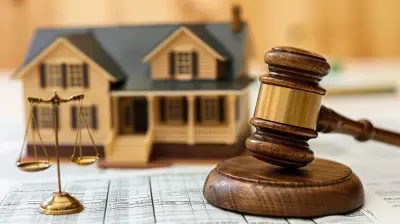6 January 2025
Buying or renting a property is one of the biggest decisions you'll ever make. But let’s be honest—a shady real estate listing can turn your dream home search into a nightmare faster than you can say “too good to be true.” With scams becoming more sophisticated every year, how can a person ensure that a property listing is legitimate?
Don't worry, I've got you! Whether you’re a first-time homebuyer, a seasoned investor, or someone trying to rent a place, here’s how you can verify the legitimacy of real estate listings and steer clear of fraud like a pro.
Why Are Fake Real Estate Listings a Problem?
Imagine hunting for a house or apartment, stumbling upon a perfect gem, and thinking, "This is too good to be true." Well, in some cases, it is. Scammers prey on eager homebuyers and renters who might be a little too quick to trust.Fake real estate listings waste time, money, and emotional energy. Even worse, they can result in identity theft or stolen deposits. So, learning how to spot a fake before it burns a hole in your wallet is key. 
Red Flags That Scream “Fake Listing”
Before diving into verification tools, let’s talk about the red flags—a bit like learning to spot wolves in sheep's clothing.1. Unbelievably Low Prices
Have you ever found a listing that sounds so perfect you’re practically drooling? And then you notice the price is suspiciously low compared to other similar properties in the area. That’s your first clue!Scammers often lure victims in by advertising properties at rock-bottom prices. Remember, if the price smells fishy, it probably is.
2. Poorly Written Listings
Does the listing have odd phrasing, typos galore, or just feel...off? Scammers often don’t bother polishing their listings. If the description looks like it was hastily copied and pasted or translated poorly, proceed with caution.3. No Photos or Generic Stock Photos
Look closely at the photos. Are they high-quality images that scream “stock photo gallery”? Or are they suspiciously absent altogether? You deserve to see actual, detailed pictures of the property—not random, too-good-to-be-true snapshots.4. Pressure to Act Fast
“Send your deposit today to secure this amazing deal!” A classic scammer move. Legitimate agents and landlords won’t pressure you to rush into decisions. If someone’s rushing you, take a step back.5. No Physical Access to the Property
If the seller or landlord claims they’re out of town or otherwise unavailable for an in-person showing but still asks for money upfront, it’s time to raise an eyebrow (or two). Legitimate real estate transactions usually involve some level of personal interaction.
How to Verify the Legitimacy of Real Estate Listings
Alright, so now that you know the warning signs, let’s dive into how you can confirm whether a listing is legit. Think of this as your real estate fraud-detection toolkit.1. Research the Address
Start with the basics. Run a quick Google search of the property’s address. Does it exist? Does it match the photos in the listing? Look for previous listings or other mentions of the property online. If you can’t find it anywhere else, that’s a red flag.Pro Tip: Use Google Maps' Street View to virtually “walk around” the property’s neighborhood. Compare it to the listing’s pictures. While not foolproof, this tool can save you a lot of headaches.
2. Check Licensing and Credentials
If you’re working with a real estate agent, great! But don’t stop there. Verify that the agent or company is licensed in your state. In the U.S., most states have a real estate licensing board where you can cross-check credentials for free.Need an extra layer of security? Look for online reviews about the agent or agency. If others have been burned, chances are, they’ve shared their experience online.
3. Assess the Photos Carefully
We've all heard the phrase, “A picture is worth a thousand words.” Well, in real estate, photos can be worth thousands of dollars. Do the listing’s photos look inconsistent? Reverse image search them on Google or TinEye. This tool will show if the images have been taken from another website (a scammer’s favorite trick).4. Request a Property Inspection
Never, ever skip the walkthrough or inspection phase. Even if you’re buying remotely, arrange for a trusted local representative to tour the property on your behalf. If the seller/landlord refuses, that’s a blinking neon sign to walk away.5. Beware of Overly Eager Sellers or Landlords
Ever feel like someone’s just a little too eager to make the deal? If the seller is quick to agree to all your terms without negotiation, it might be because they’re not selling anything real.Scammers often use urgency to get you to skip due diligence. Slow and steady wins the race here, trust me.
6. Double-Check the Contact Details
If you’re dealing with an agent, look up their contact details independently. Do they have a social media presence? A LinkedIn profile? A legitimate agency website? Scammers often use fake names and numbers, so verify, verify, verify!
Specific Tools and Techniques for Extra Peace of Mind
Here’s where things get a little high-tech. Let’s talk about how to bring out your inner detective.Use Public Property Records
In many areas, public property records are available online. These records tell you who owns a property, its previous sale price, and other valuable details. Compare this info to what the listing promises—if something doesn’t add up, dig deeper.Cross-Check Listings on Multiple Websites
If a property is listed on multiple sites with different details (like varied pricing or agent contact info), one of the listings could be fraudulent. Stick with trusted real estate platforms like Zillow, Realtor.com, or your local MLS.Talk to Local Experts
If you’re buying or renting in an unfamiliar area, connect with local real estate agents, inspectors, or even neighbors. They can provide valuable insights about the property and its history.What to Do If You Suspect a Scam
Alright, say you’ve done your homework, and something still feels...off. What now? Here’s your action plan:1. Stop Communication: If you suspect foul play, stop engaging. No need to give scammers more of your time or energy.
2. Report It: File a report with your local real estate board, the Federal Trade Commission (FTC), or the platform where you found the listing.
3. Trust Your Gut: If something feels wrong, trust that intuition. It’s better to miss out on a genuine listing than fall victim to a scam.
Wrapping It Up
Let’s be real—finding your dream home or ideal investment isn’t always a smooth ride. But by staying vigilant and following these steps, you’ll be lightyears ahead of scammers. Remember, in real estate, skepticism is your best friend.Treat every listing like a first date—a little cautious optimism goes a long way. Because at the end of the day, it’s not just about finding a house; it’s about finding YOUR house, safely and securely.













Aelith McKeehan
Always conduct thorough research and verify sources to ensure real estate listings are accurate and trustworthy.
February 8, 2025 at 12:14 PM